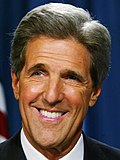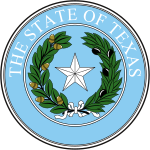
The 1996 United States presidential election was the 53rd quadrennial presidential election, held on Tuesday, November 5, 1996. Incumbent Democratic President Bill Clinton defeated former Senate Majority Leader Bob Dole, the Republican nominee, and Ross Perot, the Reform Party nominee and 1992 independent presidential candidate.

The 2008 United States presidential election was the 56th quadrennial presidential election, held on November 4, 2008. The Democratic ticket of Barack Obama, the junior senator from Illinois, and Joe Biden, the senior senator from Delaware, defeated the Republican ticket of John McCain, the senior senator from Arizona, and Sarah Palin, the governor of Alaska. Obama became the first African American to be elected to the presidency, as well as being only the third sitting United States senator elected president, joining Warren G. Harding and John F. Kennedy. Meanwhile, this was only the second successful all-senator ticket since the 1960 election and is the only election where both major party nominees were sitting senators. This was the first election since 1952 in which neither the incumbent president nor vice president was on the ballot, as well as the first election since 1928 in which neither ran for the nomination.

Super Tuesday is the United States presidential primary election day in February or March when the greatest number of U.S. states hold primary elections and caucuses. Approximately one-third of all delegates to the presidential nominating conventions can be won on Super Tuesday, more than on any other day. The results on Super Tuesday are therefore a strong indicator of the likely eventual presidential nominee of each political party.

From January 19 to June 8, 2004, voters of the Republican Party chose its nominee for president in the 2004 United States presidential election. Incumbent President George W. Bush was again selected as the nominee through a series of primary elections and caucuses culminating in the 2004 Republican National Convention held from August 30 to September 2, 2004, in New York City.

The 2004 United States presidential election in Texas took place on November 2, 2004, and was part of the 2004 United States presidential election. State voters chose 34 representatives, or electors to the Electoral College, who voted for president and vice president.
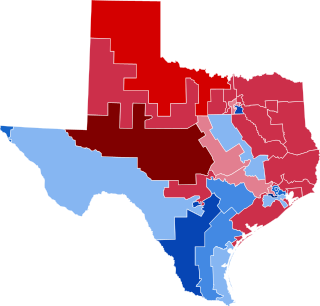
The 2006 United States House of Representatives elections in Texas were held on November 7, 2006, to determine the 32 U.S. representatives from the state of Texas, one from each of the state's 32 congressional districts. These elections coincided with the 2006 midterm elections, which included a gubernatorial election and an election to the U.S. Senate.
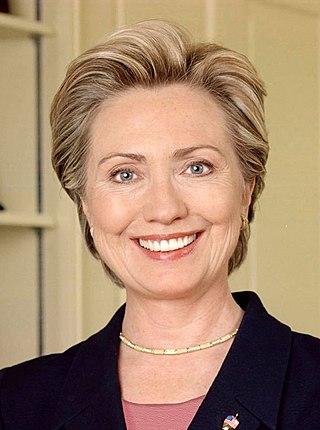
The 2008 Texas Democratic presidential primary and caucuses were a series of events to determine the delegates that the Texas Democratic Party sent to the 2008 Democratic National Convention. Delegates were selected using results from two sources: the Texas Presidential Primary held on March 4 by the Secretary of State of Texas's office, and a series of caucus events held between March 4 and June 7 by the Texas Democratic Party. The indecisive results of Super Tuesday, and the fact that Texas had the largest number of delegates among the states remaining on the Democratic primary calendar, resulted in the Texas primary receiving significant attention from both the Hillary Clinton and Barack Obama campaigns.
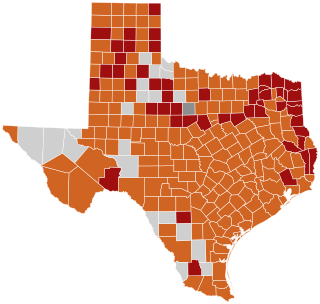
The 2008 Texas Republican presidential primary took place on March 4, 2008. John McCain won the primary election, giving him enough delegate votes to guarantee his nomination at the 2008 Republican National Convention.

From January 3 to June 5, 2012, voters of the Democratic Party chose its nominee for president in the 2012 United States presidential election. President Barack Obama won the Democratic Party nomination by securing more than the required 2,383 delegates on April 3, 2012, after a series of primary elections and caucuses. He was formally nominated by the 2012 Democratic National Convention on September 5, 2012, in Charlotte, North Carolina.

The 2012 United States presidential election in Oregon took place on November 6, 2012, as part of the 2012 United States presidential election in which all 50 states plus the District of Columbia participated. Oregon voters chose seven electors to represent them in the Electoral College via a popular vote pitting incumbent Democratic President Barack Obama and his running mate, Vice President Joe Biden, against Republican challenger and former Massachusetts Governor Mitt Romney and his running mate, Representative Paul Ryan.

The 2012 United States presidential election in Texas took place on November 6, 2012, as part of the 2012 United States presidential election in which all 50 states plus the District of Columbia participated. Texas voters chose 38 electors to represent them in the Electoral College via a popular vote pitting incumbent Democratic President Barack Obama and his running mate, Vice President Joe Biden, against Republican challenger and former Massachusetts Governor Mitt Romney and his running mate, Congressman Paul Ryan.

The 1992 United States presidential election in Illinois took place on November 3, 1992, as part of the 1992 United States presidential election. Voters chose 22 representatives, or electors to the Electoral College, who voted for president and vice president.
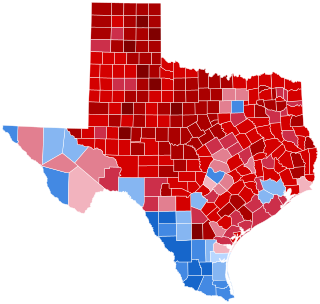
The 2016 United States presidential election in Texas took place on November 8, 2016, as part of the 2016 United States presidential election. Primary elections were held on March 1, 2016.

The 1960 United States presidential election in Texas was held on November 8, 1960, as part of the 1960 United States presidential election. The Democratic Party candidate John F. Kennedy, narrowly won the state of Texas with 50.52 percent of the vote to the Republican candidate Vice President Richard Nixon's 48.52%, a margin of two percent, giving him the state's 24 electoral votes. Despite the presence of U.S. Senator Lyndon B. Johnson on the Democratic ticket, the result made Texas the tenth closest state in the election. Nixon's strong performance in the Dallas–Fort Worth Metroplex, Harris County, the Panhandle, and the Hill Country kept the race close.

The 1952 United States presidential election in Illinois took place on November 4, 1952, as part of the 1952 United States presidential election. State voters chose 27 representatives, or electors, to the Electoral College, who voted for president and vice president.
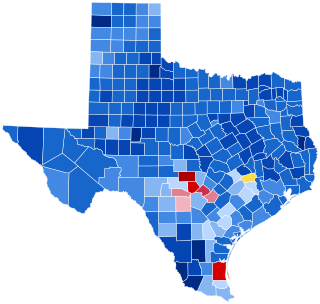
The 1944 United States presidential election in Texas took place on November 7, 1944, as part of the 1944 United States presidential election. State voters chose 23 electors to represent the state in the Electoral College, which chose the president and vice president.

The 2004 Texas Republican presidential primary was held on March 9 in the U.S. state of Texas as one of the Republican Party's statewide nomination contests ahead of the 2004 presidential election. Incumbent George W. Bush won the primary in a landslide.

The 2024 United States presidential election in Oklahoma is scheduled to take place on Tuesday, November 5, 2024, as part of the 2024 United States elections in which all 50 states plus the District of Columbia will participate. Oklahoma voters will choose electors to represent them in the Electoral College via a popular vote. The state of Oklahoma has seven electoral votes in the Electoral College, following reapportionment due to the 2020 United States census in which the state neither gained nor lost a seat.

The 2024 United States presidential election in Texas is scheduled to take place on Tuesday, November 5, 2024, as part of the 2024 United States elections in which all 50 states plus the District of Columbia will participate. Texas voters will choose electors to represent them in the Electoral College via a popular vote. The state of Texas has 40 electoral votes in the Electoral College, following reapportionment due to the 2020 United States census in which the state gained two seats.
